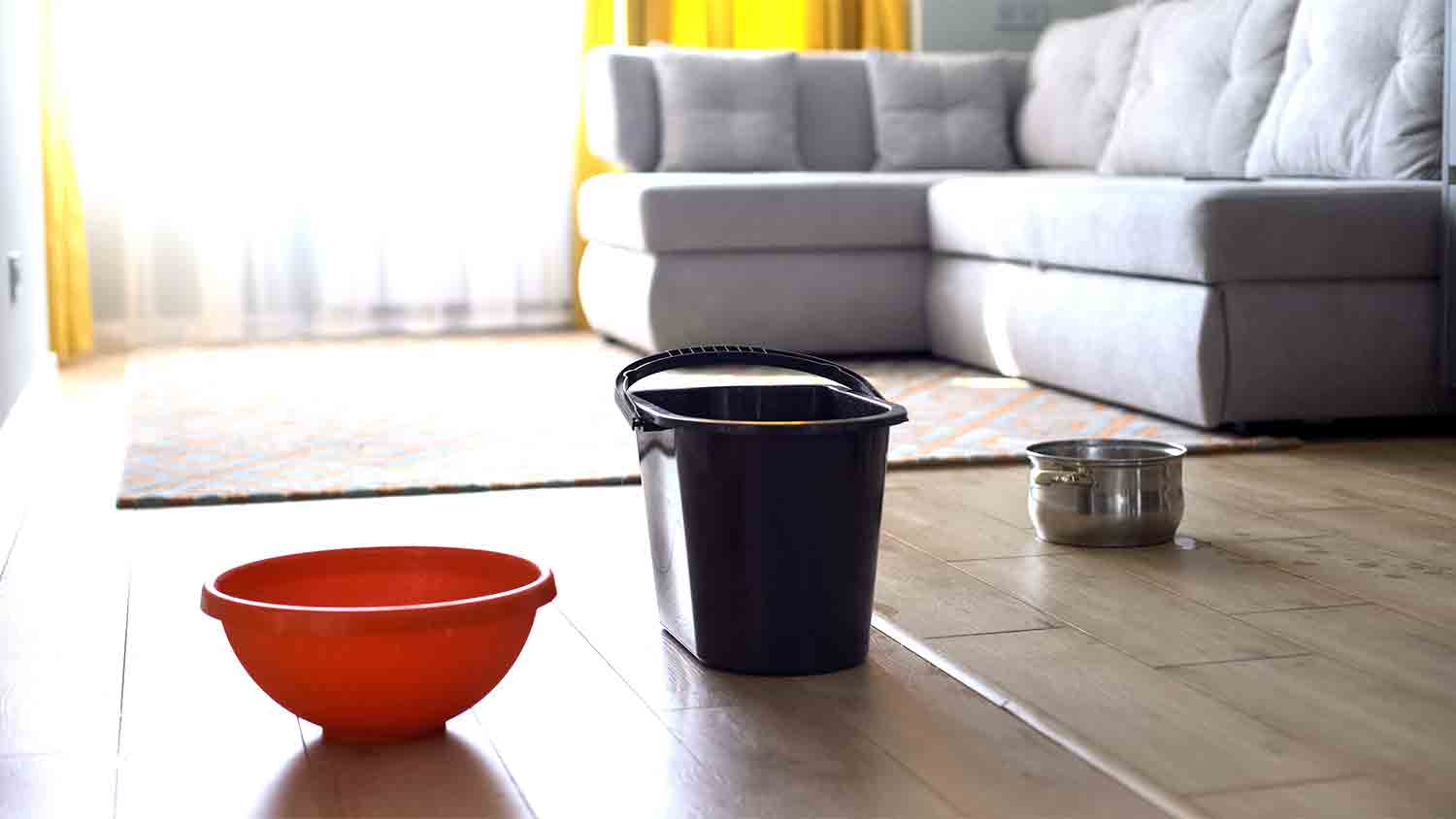
Ozone treatment can help with lingering smoke odors. Learn about ozone smoke removal costs to get an accurate idea of how to budget for this service.
Nobody likes a rainy day—especially inside of your home


You’re enjoying a relaxing evening on the couch when suddenly, you feel the dreaded drip, drip, drip of water on your head. If you see water leaking from the ceiling or even spot signs of water, like a sagging ceiling, fix the issue ASAP. Leaving moisture issues untreated can lead to further problems, such as rot, structural damage, and mold or mildew growth. Who to call for a water leak in the ceiling will depend on the root problem. Here’s how to make an informed decision.

Diagnosing a leaky roof is best left to a roofing contractor. A DIY fix can lead to more issues. The most common causes of leaky roofs are:
Missing or damaged shingles: Whether you need a few shingles replaced or your entire roof replaced, you’ll want to hire a roofing pro.
Damaged flashing: Flashing is the waterproof seal around roof elements like pipes, chimneys, and skylights. The repair is best left to a pro because precise cuts are required.
Ice dams: Snow melting and then refreezing can cause standing water on top of your roof, which can eventually lead to a leak. Hire a roofer to check your roof out to make sure everything is draining properly.
Inadequate roof slope: Low slopes can cause water pooling and inadequate runoff. A professional can assess the roof and determine if the shape needs to be changed.
Roofing work is dangerous, which is why you should never attempt to go up on the roof yourself. Plus, if damage results from a storm or accident, your homeowners' insurance may not cover work done yourself.
Instead of getting up on the roof, call a professional. While you wait, here are some steps you can and should do yourself if you notice your ceiling is dripping:
Move any valuables to a safe, dry place.
Position a bucket (or buckets) to catch excess water.
Lay a tarp to slow additional water from coming in.

Yes, a plumber can help you with a water leak in the ceiling coming from a bathroom or interior water source.
When a plumbing problem causes ceiling damage, a plumber can assess a leaking fixture and make everything watertight again. Hiring a pro ensures that the problem won’t resurface.
If the water is coming from your roof, absolutely call a roofer for repair.
To fix your roof, you’ll want to call a roofing repair person rather than any other pro. They will have the equipment and expertise necessary to pinpoint the problem and recommend a fix. A roofing pro will also address the cause of the problem and not just repair the visual damage.
A leaking ceiling can have a few primary causes. Figuring out where the leak is coming from can help you narrow down the source of the problem and get the right pro on the phone.
If you see signs of water in the ceiling on the top floor of your house, the leak might be from the roof. To assess the situation, grab a ladder, open the attic hatch, and stick your head up there. Are there signs of water damage, like a mildew smell, brownish stains, or wet insulation? If so, you’ve likely got a roof leak on your hands.
If the leak is from the roof, hire a local roofer to assess the cause and prevent additional problems from a leaky roof. It could be that the seal around the chimney is worn, or your shingles have normal wear and tear. A recent storm could have also damaged the roof.
If you see water coming from the floor above, all signs point to a potential plumbing problem. A local plumber can track down the cause and recommend a fix.
Don’t rule out a plumbing issue even if the signs of water aren’t in the ceiling directly below a bathroom, laundry room, or kitchen. The water damage on the ceiling might be just under the water source, but it’s also possible for water to travel and pool up in a low spot of the ceiling. Light fixtures are a common low spot, so check those carefully for drips. It can also be tough to pinpoint exactly which bathroom fixture is leaking, so you should check for signs of a hidden water leak.
Look for signs of water leaks around toilets, in bathroom vanities, and under kitchen sinks. You can also look for water damage on baseboards as you try to track down the source of the problem.
After addressing the cause of the ceiling water leak, you might also need a contractor or handyperson to repair the ceiling, as well as repair damaged drywall. When drywall gets saturated with water, you’ll need to replace it. On average, water damage repair costs $3,600.
Whether you’re calling a local plumber, roofer, or other professional to fix your leaking ceiling, vet the pros with these questions to ensure they’re up for the job (and have the right credentials to do it).
Are you licensed and insured? Remember that licensing requirements vary from state to state and city to city, so confirm that this pro is up-to-date in your location.
Do you offer a warranty or guarantee? A warranty shows that the pro stands by their work.
Do you have references? Your plumber or roofing expert should be established enough to have a few—at least three—references who will back their work.
Do you charge a flat rate or by the hour? Understanding the payment terms upfront will save you the headache of negotiating after the project has been completed.
Is cleanup included? The last thing you want to deal with after having a water leak repaired is the cleanup process.
Will you secure the required permits? Some repairs, especially those that involve the roof, require special permits. Ask if any are required and if the company will secure them and save you the legwork.
Remember to shop around and get quotes from at least three pros. Talking to different companies will help you gauge a ballpark figure for the work and find one that feels like the best match for the project.
It’s important to catch water damage early. The most common signs indicating a moisture problem are rotting, buckling, or peeling surfaces, which occur in 31% of cases. Damp or wet areas are also common indicators at 26.5%, as are stains, discoloration, and odors.
From average costs to expert advice, get all the answers you need to get your job done.

Ozone treatment can help with lingering smoke odors. Learn about ozone smoke removal costs to get an accurate idea of how to budget for this service.

Fire damage restoration costs vary widely based on the extent of the damage. Learn how to assess your home and estimate your total after a fire.

Fire hydrant costs might not be an expense you think about day-to-day, but they’re important to consider for the safety of your home.

Most homeowners don’t know how to deal with water damage. Use this guide to take the proper steps to minimize damage and keep your family and home safe.

A water leak in your house is definitely a cause for concern. So, how do you know who to call for a water leak in the wall? Read this guide to find out.

Follow this step-by-step guide to fix water damage to baseboards yourself. You can reuse the baseboards or make a replacement.